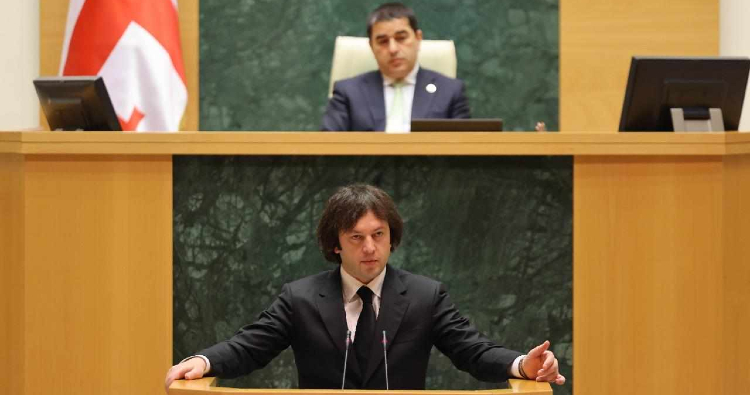Acting PM announces “ambitious plans” for airport infrastructure, says it “must keep pace” with tourism growth

He said the project involved both electricity and internet transit, with the initiative being carried out in collaboration with partners, including several member states of the European Union. Photo: Georgian Parliament
Irakli Kobakhidze, Georgia’s Acting Prime Minister, on Thursday announced “ambitious plans” for domestic airport infrastructure development by saying it “must keep the pace” with the growth of the tourism sector, calling the latter “one of the most important directions of our state’s development”.
Speaking at a plenary session of the Parliament, Kobakhidze highlighted Tbilisi International Airport in Georgia’s capital and Kutaisi International Airport for the western city, noting the country had a “growing flow of visitors, which needs to be supported”.
Passenger flow will increase from four million to 18 million after the construction of the new Tbilisi airport in Vaziani [on the location of a former airfield near the capital]. The implementation of this mega-project will be ensured within the appropriate time frame”, he said.
The expansion of Kutaisi airport has also begun. The current passenger flow is 1.7 million people and it is planned to increase resources to handle five million”, he added.
The PM noted tourism revenues had risen from $1.4 billion in 2012, and revealed the Government’s plans to increase the sector’s revenues to $6.4 billion by 2028, up from $4.5 billion this year.
In 2012, 4.7 million travellers visited Georgia, and by 2024, despite the problems caused by Covid-19 and subsequent processes, the number of visitors has increased to approximately eight million. [B] y 2028 we should exceed 11 million visitors - this is an absolutely realistic goal”, he said.
Speaking about accommodation facilities and hotels, Kobakhidze pointed out “only 777 accommodation facilities” had been in place in 2012 with 23,000 beds, with the number having grown to 2,363 facilities offering 108,000 beds, marking an approximate 4.5-fold.
By 2028, we will have 2,680 hotels with more than 142,000 beds. This is also an absolutely realistic goal. Approximately ₾1 billion ($365 mln) will be invested in the development of tourism infrastructure over the next four years”, he added.
The PM also mentioned the importance of the Black Sea submarine electricity cable project for a new transmission route to deliver green energy from Azerbaijan to Europe, noting its implementation would be completed by 2030.
He said the project involved both electricity and internet transit, with the initiative being carried out in collaboration with partners, including several member states of the European Union.
 Tweet
Tweet  Share
Share